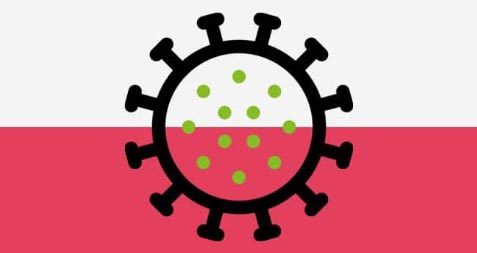COVID-19 surges in Poland with gastrointestinal symptoms adding confusion as cases being mistaken as food poisoning
Nikhil Prasad Fact checked by:Thailand Medical News Team Jul 21, 2024 1 year, 6 months, 3 weeks, 19 hours, 17 minutes ago
COVID-19 News: Poland is currently witnessing a dramatic rise in COVID-19 cases, with infections increasing tenfold over the past month. The dominant variant of SARS-CoV-2 in the country is Omicron, along with its new subvariants JN.1 and the various KP sub-lineages. Dr Paweł Grzesiowski, the Chief Sanitary Inspector, has highlighted the urgency of the situation, predicting that this new wave of infections could last until late October or November, with a peak expected in mid-September.
 COVID-19 surges in Poland with gastrointestinal symptoms adding confusion as cases
COVID-19 surges in Poland with gastrointestinal symptoms adding confusion as cases
being mistaken as food poisoning
The New Variants: A Different Challenge
The new Omicron subvariants, particularly the KP variants, are presenting additional challenges. While they produce typical Omicron symptoms such as fever, cough, conjunctivitis, and sore throat, the KP variants are also associated with gastrointestinal issues. Symptoms like diarrhea, vomiting, and abdominal pain are becoming increasingly prevalent, leading many to mistake these signs for food poisoning, especially during the summer vacation period. This misdiagnosis can significantly increase the risk of virus transmission, as individuals may not seek testing or appropriate medical attention.
Complications and Long-term Effects
Dr Grzesiowski has also raised concerns about the potential long-term health effects of post-COVID chronic inflammation, which can lead to serious conditions such as diabetes and circulatory failure. This highlights the importance of recognizing and managing symptoms early to prevent further health complications.
He told local
COVID-19 News outlets that many are ignorant about the long-term health complications that exposure to the SARS-CoV-2 virus can cause and most are ignorantly assuming that COVID-19 is comparable to common colds and flu.
https://www.polskieradio.pl/395/7784/Artykul/3405140,tenfold-increase-in-covid19-cases-in-poland
https://poland-insider.com/rezkij-rost-zabolevaemosti-covid-19-v-polshe-ozhidaetsya-pik-osenyu/
Vaccination Efforts and New Developments
In response to the rising cases, there is active work on developing an updated vaccine targeting the JN1 variant especially the new KP and LB variants currently in circulation. According to Professor Robert Flisiak from the Medical University of Białystok, these vaccines might be available by September, although widespread use is not expected until October. Since the onset of the pandemic, over 58 million COVID-19 vaccinations have been administered in Poland, showcasing a strong public health response. However, the emergence of new subvariants necessitates ongoing efforts to vaccinate and educate the public
about the evolving symptoms and risks of COVID-19. (How effective and dangerous these vaccines are is anyone’s guess.)
The Role of Public Restrooms in Virus Transmission
Public restrooms have become significant points of transmission for the JN1 variant due to its gastrointestinal symptoms. This underlines the importance of maintaining strict hygiene practices in these areas and increasing public awareness about the potential risks.
Preparing for the Autumn Peak
Health officials are bracing for a challenging autumn, with the current wave expected to peak in mid-September. The continued increase in cases underscores the need for vigilance and adherence to public health guidelines. As Dr Grzesiowski predicts, the wave of infections might extend until late October or November, emphasizing the need for sustained efforts in controlling the virus's spread.
The Importance of Timely Diagnosis and Public Awareness
Timely diagnosis and increased public awareness are critical in managing the next wave of the pandemic. Given the unusual symptoms of the new subvariants, it is essential for the public to be informed and vigilant. Recognizing symptoms early and seeking appropriate medical advice can help reduce the spread of the virus and mitigate the impact on public health.
Conclusion: A Call for Vigilance and Preparedness
The surge in COVID-19 cases in Poland, driven by the new Omicron subvariants JN.1 and the various KP sub-lineages, presents new challenges for the medical community and the public. The gastrointestinal symptoms associated with JN.1 can lead to misdiagnosis and increased transmission, particularly in public spaces like restrooms. With the potential for serious long-term health effects and a predicted peak in infections this autumn, it is crucial to maintain vigilance, adhere to public health measures, and ensure timely vaccination and diagnosis. Public awareness and preparedness will be key in navigating this new phase of the pandemic and protecting public health.
For the latest
COVID-19 News, keep on logging to Thailand Medical News.
Read Also:
https://www.thailandmedical.news/news/italy-facing-fast-rise-in-covid-19-infections-and-hospitalizations-lazio-region-worst-hit
https://www.thailandmedical.news/news/covid-19-hospitalizations-in-greece-jumps-by-30-percent-in-a-week
https://www.thailandmedical.news/news/u-s-medical-news-kentucky-witnessing-a-rise-in-respiratory-infections-including-covid-19
https://www.thailandmedical.news/news/covid-19-infections-and-hospitalizations-rising-across-all-prefectures-in-japan
https://www.thailandmedical.news/news/covid-19-positivity-rate-hits-28-percent-in-mexico-as-sars-cov-2-quietly-ravages-the-country
https://www.thailandmedical.news/news/most-americans-oblivious-that-covid-19-is-now-surging-in-45-states-of-which-26-have-high-infections-levels
